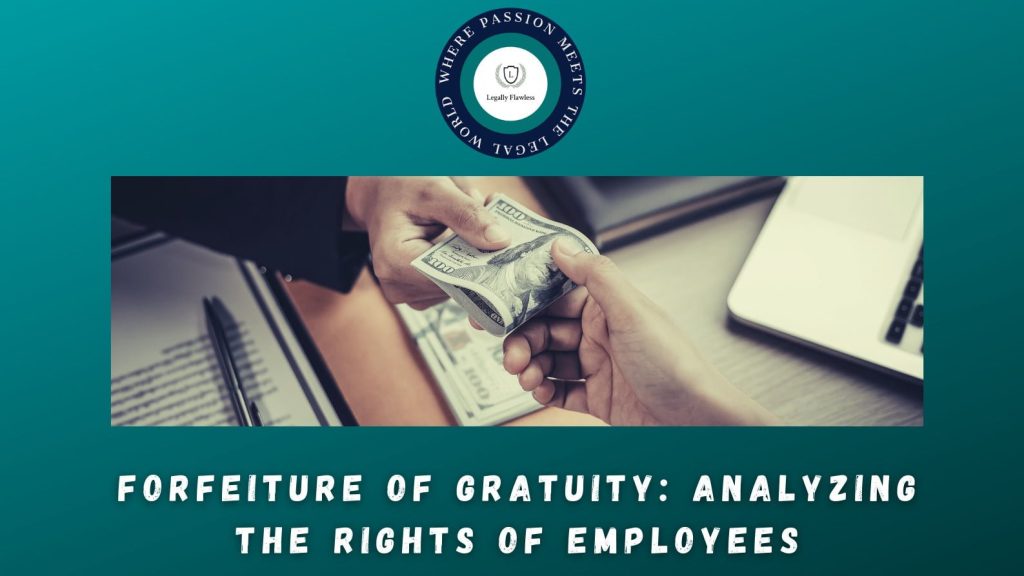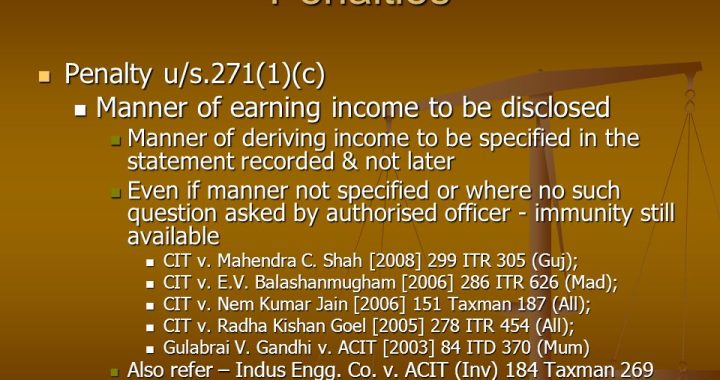Forfeiture of Gratuity by Employer- What are the Remedies for an employee- Can employer be challenged?

Foreiture of Gratuity on account of wrong decision by employer on moral turpitude
The recent Supreme Court judgment primarily impacts employees terminated for misconduct involving moral turpitude, as it allows employers to forfeit gratuity without requiring a criminal conviction. However, for employees terminated for reasons other than moral turpitude, the judgment does not directly alter their situation. Here’s how it might indirectly affect them:
Salient takeaway of the judgement- Forfeit Gratuity in Moral Turpitude Cases
Forfeiture Without Conviction: The ruling empowers employers to forfeit gratuity based on internal disciplinary findings of moral turpitude, without needing a court conviction.
Related Read: Employer can forfeit gratuity of an employee in case of moral turpitude
Indirect Impact on Other Termination Reasons
Employer Discretion exercised aggresively:
While the judgment does not directly affect employees terminated for reasons like performance issues, loss of confidence, or other non-moral turpitude misconduct, it may influence employer behaviour. Employers might become more aggressive in their disciplinary processes, potentially leading to more terminations being framed as moral turpitude cases to leverage this new legal precedent.
To maintain transparency as also to be ready for any litigation by employee on this account, employers should emphasize thorough documentation of misconduct and evidence collection to support disciplinary actions. This documentation will be crucial in justifying any severe disciplinary measures, including termination or forfeiture of benefits.
Natural Justice Principles to be applied by Employer:
The judgment emphasizes the importance of following principles of natural justice in disciplinary proceedings. This could indirectly benefit employees terminated for non-moral turpitude reasons by ensuring that all terminations, regardless of the reason, are conducted fairly and with due process.
Legal Precedents:
The clarification that moral turpitude does not require a criminal conviction might lead to more legal challenges regarding the fairness and reasonableness of terminations. This might embolden employers to summarily terminate any employee and forfeit his gratuity and at same time, employees terminated for other reasons might find it easier to argue against unfair dismissal if they can demonstrate that their employer’s actions were arbitrary or did not follow proper procedures.
Forfeiture of Gratuity- Developments required Going Forward
Appeal Processes:
Implementing or enhancing appeal processes within companies should be established to ensure fairness and provide employees with a clear path for contesting disciplinary decisions so that the decision by employers stands test of the law at any later stage.
Future Legal Developments:
This ruling might prompt further legal discussions and potential amendments to employment laws to ensure that employees’ rights are protected while maintaining employers’ ability to enforce ethical standards.
While the judgment primarily affects employees terminated for moral turpitude, it could indirectly influence how employers approach terminations for other reasons to terminate an employee.
What if at a later stage it is proven that forfeiture of gratuity was not justified
If it is later proven that an employer’s decision to withhold gratuity was incorrect, the employee may have several avenues to challenge this decision and potentially recover the withheld amount. Here’s how this situation might unfold:
Legal Remedies for Employees
Challenging the Decision:
The employee can file a legal challenge against the employer’s decision, arguing that the misconduct did not constitute moral turpitude or that the employer failed to follow principles of natural justice during the disciplinary process.
Principles of Natural Justice:
The Supreme Court’s judgment emphasizes the importance of adhering to principles of natural justice, which include providing notice to the employee and allowing them to present their case. If these principles were not followed, the employee can argue that the decision was unfair and should be overturned.
Quantum of Forfeiture:
Even if the employer’s decision is upheld, the employee might contest the extent of the forfeiture. The Supreme Court has noted that the quantum of forfeiture should depend on the gravity of the misconduct.
Potential Outcomes where the forfeiture of Gratuity is challenged by Employee
Reversal of Decision:
If the court finds that the employer’s decision was incorrect, it may order the employer to pay the withheld gratuity. This could happen if the misconduct was not proven to involve moral turpitude or if the employer failed to follow proper procedures.
Partial Payment:
In cases where some misconduct is acknowledged but the employer’s decision is deemed excessive, the court might order a partial payment of the gratuity, reflecting a more balanced approach based on the severity of the misconduct.
Would forfeiture of Gratuity by employers would be easier to implement?:
This judgment could lead to more challenges regarding the fairness and reasonableness of gratuity forfeiture decisions. Employers will need to ensure that their disciplinary processes are robust and fair to avoid legal disputes.
Compensation for Wrongful Withholding:
Depending on the circumstances, the employee might also seek compensation for any financial losses incurred due to the wrongful withholding of gratuity.
Forfeiture of gratuity depends on the laws governing employment in a particular country. In India, for
What Should an Employee Do if Gratuity Is Unfairly Forfeited?
Request a Written Explanation from the employer.
File a complaint with the Controlling Authority under the Gratuity Act.
Seek legal help if the employer does not comply.
Draft of the Letter than can be used to sent Notice to Employer for Unlawful Forfeiture of Gratuity
Subject: Legal Notice for Unlawful Forfeiture of Gratuity
Dear [Employer’s Name],
I am writing to formally address the unlawful forfeiture of my gratuity amount, which is due to me under the Payment of Gratuity Act, 1972. I was employed with [Company Name] from [Start Date] to [End Date] as a [Designation], completing a total tenure of [Number of Years] years. As per Section 4 of the Act, I am entitled to receive my gratuity since I have completed more than five years of continuous service.
However, I have been informed that my gratuity has been forfeited on the grounds of [mention reason given by employer, if any]. I strongly contest this decision, as it is unjustified and does not comply with the provisions of the law.
As per Section 4(6) of the Payment of Gratuity Act, 1972, gratuity can only be forfeited in cases where an employee has been dismissed due to:
- Misconduct involving moral turpitude; or
- Wilful negligence causing damage to employer’s property.
I would like to highlight that I was neither involved in any misconduct nor have I caused any financial or reputational loss to the company. The forfeiture of my gratuity is thus arbitrary, unlawful, and in violation of my statutory rights.
Therefore, I demand the following actions be taken immediately:
- Payment of my full gratuity amount of INR [Amount] within [reasonable timeframe, e.g., 15 days].
- A written explanation stating the legal grounds for the forfeiture, if the company maintains its stance.
Failure to comply with this request will compel me to take appropriate legal action, including but not limited to:
- Filing a complaint with the Controlling Authority under the Payment of Gratuity Act, 1972.
- Approaching the Labour Court and other legal forums to claim my rightful dues.
- Seeking interest and compensation for undue harassment and delay.
I hope for an amicable resolution to this matter and expect your response within [reasonable deadline, e.g., 7-15 days] from the date of this notice. Please consider this notice as my formal and final attempt to resolve the issue before initiating legal proceedings.
Yours sincerely,
(Employee Name)
CC: [If sending copies to HR, legal team, or labour authorities]


 ITAT Amritsar: No Section 269SS Violation for One-Time Cash Payment Before Sub-Registrar
ITAT Amritsar: No Section 269SS Violation for One-Time Cash Payment Before Sub-Registrar  Tax Officials Unleash Digital Dragnet: How New Raid Powers Redefine Privacy, Property Rights in India and likely to Fuel Corruption
Tax Officials Unleash Digital Dragnet: How New Raid Powers Redefine Privacy, Property Rights in India and likely to Fuel Corruption  Income Tax Department Rewards for Reporting Tax Evasion: A Comprehensive Guide
Income Tax Department Rewards for Reporting Tax Evasion: A Comprehensive Guide  Employer can forfeit gratuity of an employee in case of moral turpitude
Employer can forfeit gratuity of an employee in case of moral turpitude  Diving Deeper: The Impact of the New Tax Bill on Dairy and Farming Income
Diving Deeper: The Impact of the New Tax Bill on Dairy and Farming Income  Bombay High Court Upholds Section 271(1)(c) Penalty for Deliberate Non-Disclosure
Bombay High Court Upholds Section 271(1)(c) Penalty for Deliberate Non-Disclosure  Forfeiture of Gratuity by Employer- What are the Remedies for an employee- Can employer be challenged?
Forfeiture of Gratuity by Employer- What are the Remedies for an employee- Can employer be challenged?